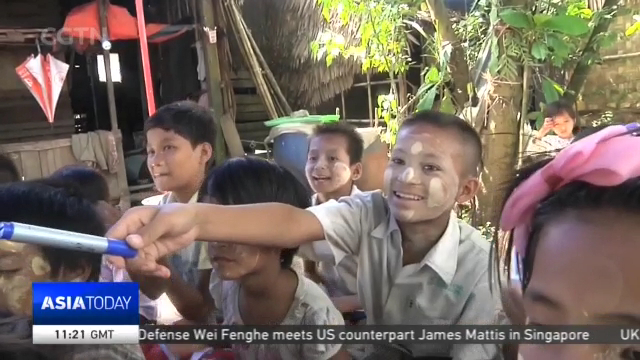
19:55, 18-Oct-2018
Myanmar Child Labor: Program brings working children back to classrooms
Updated
19:39, 21-Oct-2018
03:08

Today we conclude our special series of "Eradicating Poverty in Asia" with a focus on efforts in Myanmar to end child labor. Across the Southeast Asian nation, you'll find children who hold down jobs instead of going to school. It's a widespread problem in this impoverished country. But as Dave Grunebaum reports from Yangon, a group of people are helping some of them get back into the classroom.
At a time of day when most children are in school, 12-year-old Sandar Lin is at work in a river in Yangon.
Sandar Lin along with several of her friends and their parents are collecting rocks that will eventually end up at construction sites. They each earn the equivalent of about one U.S. dollar for a few hours of work.
SANDAR LIN CHILD WORKER "I work so my family can buy food and medicine when we are sick."
This 25 by 25 foot one-room home is where Sandar Lin lives with her parents plus four brothers and sisters.
This story of hardship is a common one across Myanmar, where more than a quarter of the population is impoverished and one out of five children aged between 10 to 17 goes to work instead of school to help support their families. It's a cycle of poverty that goes from one generation to the next.
DAVE GRUNEBAUM YANGON "Myanmar has laws prohibiting work for children under the age of 14 and only allowing limited hours for those under 16 but enforcement is lax."
While circumstances are keeping these kids out of school, there's a program that's bringing the classroom to them.
It's the Myanmar Mobile Education Project also known as myME. It teaches subjects including Science, Maths and English and provides vocational training for older kids as well.
The goal is to give these children an education so they're not stuck in low paying jobs for the rest of their lives.
TIM AYE-HARDY MYME EXECUTIVE DIRECTOR "Some kids drop out of school at such a young age they don't even know how to read and write. We're teaching them how to read, write, and also basic life skills like critical thinking, problem-solving skills, working with others."
Tim Aye-Hardy is myME's co-founder and executive director. He's a Myanmar native who moved to the U.S. in 1989. When he returned to his motherland more than two decades later he was struck by how much child labor was taking place in the country.
TIM AYE-HARDY MYME EXECUTIVE DIRECTOR "So my first reaction was very simple since they can not come to school why don't we just bring classrooms to where they work?"
With an annual budget of 250-thousand dollars from private donations, myME now teaches almost 900 kids at about 50 locations in five cities across the country. It's a small number compared to the more than one-million child workers in Myanmar, but myME is a big deal for these kids.
Sandar Lin says she loves going to class and dreams about having a particular job when she's an adult.
SANDAR LIN CHILD WORKER "I want to become a teacher."
Thanks to myME her dream might become a reality. DG, CGTN, YANGON.

SITEMAP
Copyright © 2018 CGTN. Beijing ICP prepared NO.16065310-3
Copyright © 2018 CGTN. Beijing ICP prepared NO.16065310-3